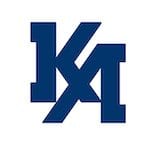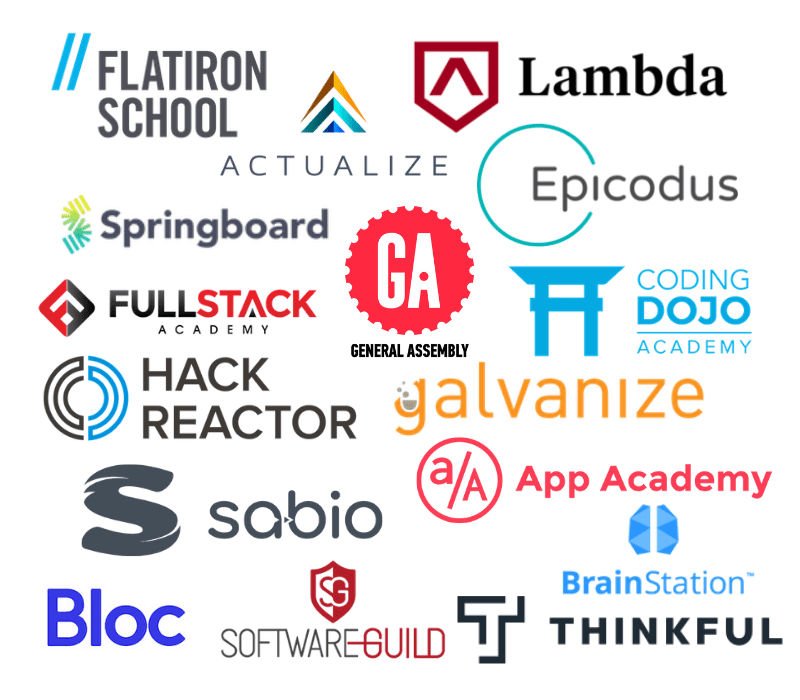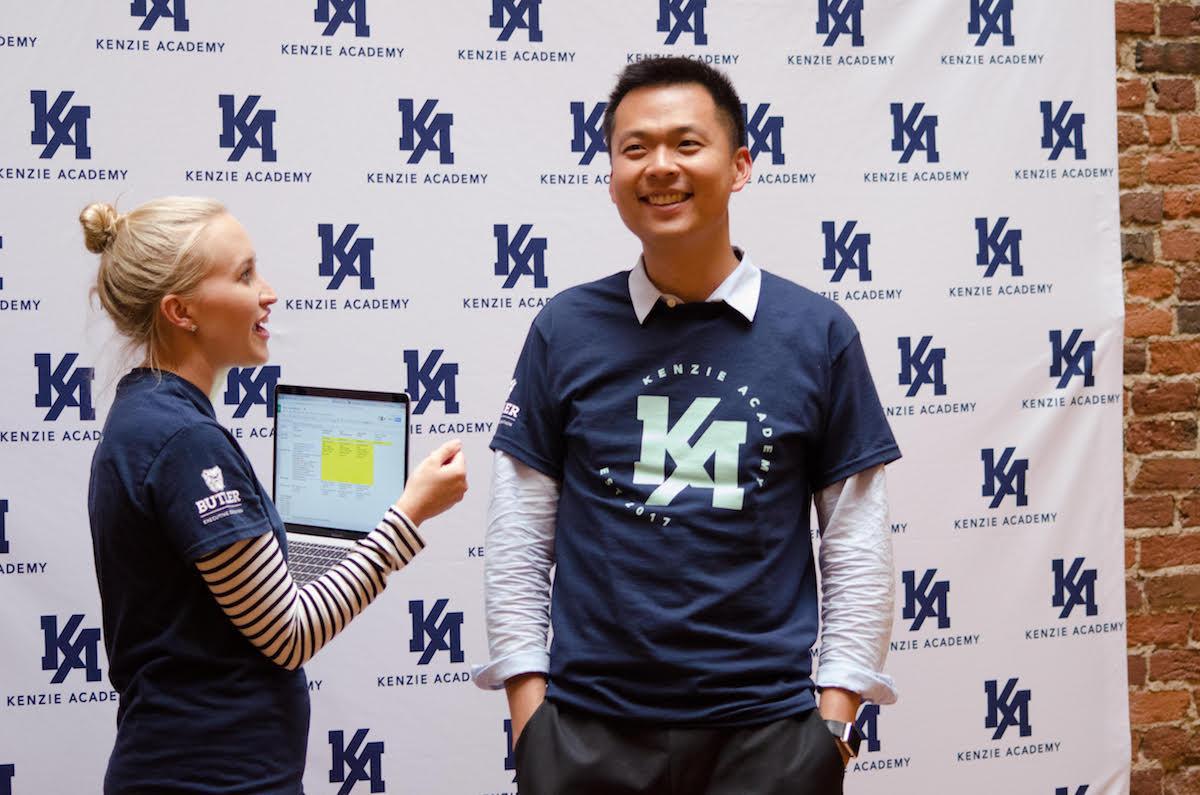The software engineering industry is in a tough position. The number of software developer jobs is expected to rise by as much as 21 percent by 2028, and there are already over half a million job openings in technical roles.
Despite (or because of) this growth, universities have not been able to yield enough graduates to satisfy the market demand. Even if universities did start to up their graduation rates, there is still a question of whether the skills students learn in a computer science major are fully aligned with the needs of many modern tech companies.
Over the last few years, coding bootcamps, an innovative alternative to traditional higher education, have become more popular. These institutions have a big promise: they will train students for a certain job in the technology sector in only a few months. And toward the end of a bootcamp program, the school will provide job placement services to students to help them bridge the gap between their training and employment—a crucial part of ensuring graduates’ success.
However, coding bootcamps have developed a reputation for being solely suited to the needs of students who intend to work in high-tech jobs in places like Silicon Valley, where skilled workers can earn higher-than-average salaries.
But one coding bootcamp is challenging this assertion and building out a training program designed to help those who want to pursue a career in technology in the Heartland: Kenzie Academy.
What is Kenzie Academy?

Founded in 2017, the Indianapolis-based Kenzie Academy offers year-long training programs in software engineering/user experience design and product management.
Kenzie has a student body that’s 66 percent online, which is higher than many other coding bootcamps. Kenzie is betting on the idea that students do not need to move to a place like Silicon Valley to pursue a successful career in tech; they can do so from the Heartland (or anywhere else) as well.
Competing in a Crowded Marketplace

There are over 110 active coding bootcamps, and while there has been some consolidation in the industry in recent years, there is still a lot of competition. All of these bootcamps offer different styles of education and different courses, but with the same underlying value proposition: helping students find good jobs. Kenzie is differentiating themselves in this market by going after the Heartland; a new demographic which bootcamps have historically left out.
Indeed, Lambda School and other coding bootcamps offer online education programs which are accessible to students from anywhere. That said, online courses are not the same as immersive, in-person programs. Kenzie Academy offers both online courses and in-person classes at their campus in Indianapolis, which allows students to choose between working in-person, or taking a course online.
In-person offerings often give students a better sense of inclusiveness in a program as they are in the same physical space as other students who are encountering the same problems as them.
According to a recent TechCrunch interview, Kenzie conducted a survey where only one Silicon Valley-based company was on their students’ list of the top five tech companies they wanted to work for. Demonstrating that Kenzie is not looking to be like other bootcamps who help people find jobs at Google or other big tech companies—they want to help students learn the skills they need to get a job at any tech company.
There are many excellent companies in the Heartland who need technical talent, but are unable to compete with Silicon Valley’s culture, high salaries, job benefits, and stock options. Kenzie’s program is helping to bridge this gap by training students in the skills they need, and helping them find jobs at local tech companies who can still offer good jobs.
The Heartland presents a major opportunity for technical job training. The last wave of disruption in the 1980s, which brought a new era of automation to the economy, created many new jobs. Middle-wage, middle-skill manufacturers’ jobs were automated, which left many people having to look for new jobs in different fields.
While a quarter of all jobs have a high chance of being wiped out by automation, the states with the highest share of at-risk jobs are mostly in the Heartland: Indiana, South Dakota, Kentucky, Iowa, and Arkansas. If Kenzie can train students effectively in computing jobs, they will be well-positioned to help the labor market in these states catch up with automation, and prepare them for the Fourth Industrial Revolution.
In addition, if schools such as Kenzie can increase the skills of people in the Heartland, more tech companies may decide to set up shop in these areas, and in doing so bring new capital and jobs into the local economies.
Embracing a New Structure

Kenzie Academy is also breaking the mold with a different program structure. While a number of coding bootcamps are betting on short-term programs—between three and six months—wherein students should learn everything they need to know about a certain career in tech. Kenzie Academy believes that a three-month training program is not sufficient enough to help students successfully find a job in technology.
As a result, Kenzie’s program lasts for one year, which they feel gives students enough time to explore topics in-depth, while still being shorter than the traditional four-year college degree. Students are expected to commit at least 40 hours each week in order to graduate on time.
This is a big commitment, especially for working adults who represent a significant portion of the bootcamp’s students. That said, Kenzie has taken a few measures to ensure students who are accepted into the program can sustain themselves while learning. For example, Kenzie Academy has launched an aptitude assessment which students must complete before they are accepted. This allows Kenzie to only admit students who are ready for the intensity of the year-long program.
Kenzie has also partnered with Kelly Services, a staffing firm, to provide part-time employment to their students in customer and technical support. While these jobs may be basic, they give students an opportunity to earn money while training. Other bootcamps like Thinkful offer living stipends to students who need capital to pay their bills, but this results in a higher overall cost of tuition for students.
Kenzie’s model allows students to pay their bills while preparing for a job in only one year—a bold vision, but one which appears to be paying off. Although the jobs students take with Kelly Services are not directly related to their coursework, it will allow them to learn valuable interpersonal skills such as communication, teamwork, and critical thinking—all valuable skills in the software engineering industry.
This is in line with a broader trend in education; where some employers are offering earn-and-learn programs—students earn money to pay their bills while training and acquiring skills on-the-job. But Kenzie’s program shows this model can work in a more traditional training model as well.
Kenzie Academy has a graduation rate of 85 percent, and a 90 percent job placement rate six months after graduation, which shows that their new Heartland-focused bootcamp model is fulfilling its value proposition.
Promoting Accessibility Through ISAs
Kenzie Academy is one of a growing number of coding bootcamps offering Income Share Agreements (ISAs) to their students. ISAs are a new method of education financing where rather than paying for an education upfront, students will pay a percentage of their post-graduation income.
In Kenzie’s case, students can agree to pay a $100 commitment fee upfront and share 13 percent of their income for four years after graduation. Students will only begin making payments if they earn over $40,000 per year, which protects underemployed or unemployed students from making payments they cannot afford.
The main benefits of offering ISAs integrates well with Kenzie’s vision to expand access of a computer science education to students in the Heartland. Indeed, ISAs can help promote inclusiveness in education by allowing people who are not being served by traditional student loans.
For example, students who cannot access private loans—which typically come with high interest rates—would traditionally not be able to attend a training program, as most bootcamp students are ineligible for federal aid. ISAs, however, allow any student who has potential and is willing to invest time in a training program to raise the capital they need to finance their education after the fact.
The people who are unable to access private loans are often those who have a poor credit score, or a criminal record. But offering an ISA allows Kenzie to expand their offerings to these demographics which are often populated by people from under-represented groups. The value of ISAs appears to be resonating with Kenzie’s student body. In 2018, around 60 percent of their students opted for an ISA; the remainder used Kenzie’s upfront or monthly payment options. This year, however, 85 percent of Kenzie’s students financed their education through an ISA.
The Future of Kenzie Academy
In order to fuel their ambitious vision of expanding access to high-quality technical training for people in the Heartland, Kenzie recently raised a $100 million in a debt-financing round from Community Investment Management. This financing round allowed Kenzie to reduce their ISA terms from 17.5 percent of a students’ post-graduation income to 13 percent, and reduced the payment cap—the maximum amount a student will repay—from 2.5x the cost of tuition to 1.75x.
This financing round was ultimately an attempt to bring down the cost of attending the school, and moves more risk away from the students and onto the school due to the reduced payment cap. Kenzie has also raised $13.6 million to date in venture capital which has helped them grow and scale their operations.
Kenzie Academy has demonstrated that bootcamps are not just for Silicon Valley jobs; with a little work, bootcamps can help people pursue any career in technology. This is in sharp contrast to some recent commentary around bootcamps that argues the bootcamp model can only be effective in areas like Silicon Valley, where the tech job market is so strong. Kenzie Academy has already pioneered many innovations in the bootcamp space, and if they can continue to help students get hired, they will be in a good position to disrupt post-secondary education in rural America.
About us: Career Karma is a platform designed to help job seekers find, research, and connect with job training programs to advance their careers. Learn about the CK publication.




